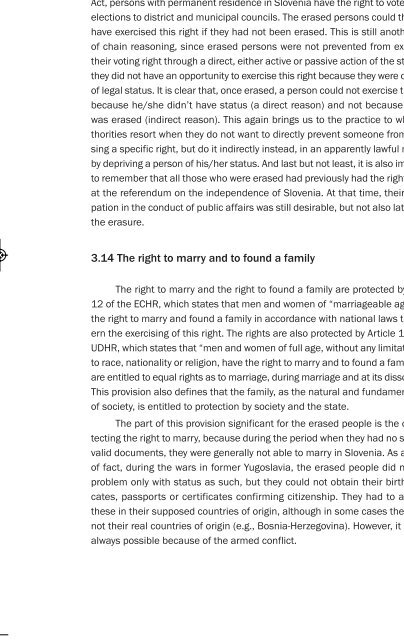The Scars of the Erasure_web
The Scars of the Erasure_web
The Scars of the Erasure_web
- No tags were found...
Create successful ePaper yourself
Turn your PDF publications into a flip-book with our unique Google optimized e-Paper software.
<strong>Erasure</strong>_4a 10.1.11 20:29 Page 112112 THE SCARS OF THE ERASUREfrage and shall be held by secret ballot, guaranteeing <strong>the</strong> free expression <strong>of</strong> <strong>the</strong>will <strong>of</strong> <strong>the</strong> electors;” and <strong>the</strong> “right <strong>of</strong> access, on general terms <strong>of</strong> equality, topublic service in one’s country.” (ICCPR , Article 25)According to <strong>the</strong> Slovenian legislation, i.e., Article 5 <strong>of</strong> <strong>the</strong> Local ElectionsAct, persons with permanent residence in Slovenia have <strong>the</strong> right to vote in localelections to district and municipal councils. <strong>The</strong> erased persons could <strong>the</strong>reforehave exercised this right if <strong>the</strong>y had not been erased. This is still ano<strong>the</strong>r case<strong>of</strong> chain reasoning, since erased persons were not prevented from exercising<strong>the</strong>ir voting right through a direct, ei<strong>the</strong>r active or passive action <strong>of</strong> <strong>the</strong> state, but<strong>the</strong>y did not have an opportunity to exercise this right because <strong>the</strong>y were deprived<strong>of</strong> legal status. It is clear that, once erased, a person could not exercise this rightbecause he/she didn’t have status (a direct reason) and not because he/shewas erased (indirect reason). This again brings us to <strong>the</strong> practice to which authoritiesresort when <strong>the</strong>y do not want to directly prevent someone from exerci -sing a specific right, but do it indirectly instead, in an apparently lawful manner,by depriving a person <strong>of</strong> his/her status. And last but not least, it is also importantto remember that all those who were erased had previously had <strong>the</strong> right to voteat <strong>the</strong> referendum on <strong>the</strong> independence <strong>of</strong> Slovenia. At that time, <strong>the</strong>ir participationin <strong>the</strong> conduct <strong>of</strong> public affairs was still desirable, but not also later, after<strong>the</strong> erasure.3.14 <strong>The</strong> right to marry and to found a family<strong>The</strong> right to marry and <strong>the</strong> right to found a family are protected by Article12 <strong>of</strong> <strong>the</strong> ECHR, which states that men and women <strong>of</strong> “marriageable age” have<strong>the</strong> right to marry and found a family in accordance with national laws that govern<strong>the</strong> exercising <strong>of</strong> this right. <strong>The</strong> rights are also protected by Article 16 <strong>of</strong> <strong>the</strong>UDHR, which states that “men and women <strong>of</strong> full age, without any limitation dueto race, nationality or religion, have <strong>the</strong> right to marry and to found a family. <strong>The</strong>yare entitled to equal rights as to marriage, during marriage and at its dissolution.”This provision also defines that <strong>the</strong> family, as <strong>the</strong> natural and fundamental unit<strong>of</strong> society, is entitled to protection by society and <strong>the</strong> state.<strong>The</strong> part <strong>of</strong> this provision significant for <strong>the</strong> erased people is <strong>the</strong> one protecting<strong>the</strong> right to marry, because during <strong>the</strong> period when <strong>the</strong>y had no status orvalid documents, <strong>the</strong>y were generally not able to marry in Slovenia. As a matter<strong>of</strong> fact, during <strong>the</strong> wars in former Yugoslavia, <strong>the</strong> erased people did not haveproblem only with status as such, but <strong>the</strong>y could not obtain <strong>the</strong>ir birth certificates,passports or certificates confirming citizenship. <strong>The</strong>y had to apply for<strong>the</strong>se in <strong>the</strong>ir supposed countries <strong>of</strong> origin, although in some cases <strong>the</strong>se werenot <strong>the</strong>ir real countries <strong>of</strong> origin (e.g., Bosnia-Herzegovina). However, it was notalways possible because <strong>of</strong> <strong>the</strong> armed conflict.


